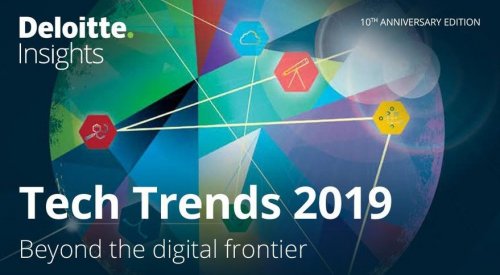COLORADO SPRINGS – Emerging digital technologies and innovative operating models will expand the role of space in multiple economic sectors, according to, “Tech Trends 2019: Space industry perspective,” a report released April 15 by Deloitte.
In the past, space technologies like GPS often disrupted the status quo in other industries. Now, technologies like artificial intelligence, blockchain and augmented reality “can disrupt the status quo of what we currently think of as space technology by advancing it, optimizing it or making it cheaper, faster or more accessible,” said Jeff Matthews, Deloitte specialist leader focused on space innovation, finance and technology.
After ten years of publishing annual reports on technology trends affecting companies broadly, Deloitte produced a report focused on the space industry because “there is so much happening in space right now that mirrors what we are seeing happening in technology and innovation,” said Brett Loubert, a principal in Deloitte’s federal consulting practice.
Many new space startups are software companies at heart, Matthews told SpaceNews at the 35th Space Symposium. “They are leveraging software to exploit the hardware that has been developed or to push it into new mission sets,” he added.
Companies rely on artificial intelligence, for example, to digest weather and remote sensing data. In the future artificial intelligence will play a wider role in hiring, human-machine interactions and core business processes, according to the report.
More and more space-related operations, like constellation management and ground networks, are being offered as-a-service, meaning companies can outsource those activities. “If I’m not paying the overhead of managing a piece of infrastructure, especially space infrastructure, that can reduce either a massive cost or burden on my business model that makes me more competitive and sustainable,” Matthews said.
Increasing global connectivity also offers challenges and opportunities. “Plan for the upcoming explosion of bandwidth and spectrum congestion,” Deloitte recommends.
Intelligent interfaces, like computer vision and augmented reality, can speed data delivery, minimize training costs and enhancing mission assurance, the report said. “See beyond the long-established standards to imagine new methods of delivering data to a user,” Deloitte recommends.
Experience reimagined, is a related trend described in the new report. Space data customers “crave dynamic, relatable engagements and insight,” the report said. “For downstream space applications, use new tools like artificial intelligence to improve customer experience with data.”
Organizations also should focus on cyber security throughout their engineering and information technology groups, Deloitte said. “Don’t test it in at the end,” Deloitte said. “Build it in throughout the system.”
Remarkable changes have occurred in the last decade. No longer the exclusive preserve of government agencies or aerospace and defense companies, “space is drawing from backgrounds that are increasingly diverse and cross-functional,” Loubert said. “There’s more opportunity for companies or industries that traditionally were not in space to start getting involved in a new industry, a new economy. Likewise, there’s more opportunity for people who are space-focused to build a business case related to space.”
- SN Military.Space | Air Force wants new GPS in orbit before year’s end • DoD big on OTAs • Space Force by 2020 a long shot
- SN Military.Space | Who’s who in the national security space workforce • Doubts raised about cost of Space Force • U.S., Brazil to share space data
- SN Military.Space | Space Force a political football • The next big thing in space missile defense • How to make satellites ‘defendable’
- Why Sierra Nevada’s owners are betting big on Dream Chaser
- SpaceX takes top honors in SpaceNews Awards for Excellence & Innovation
Share with your friends

(0) Comments
This article comments are currently no :(